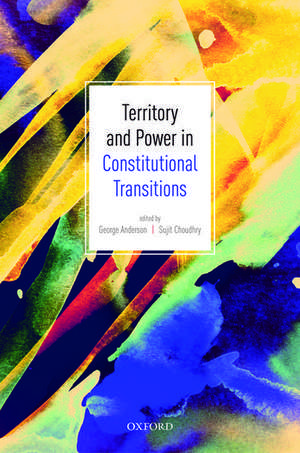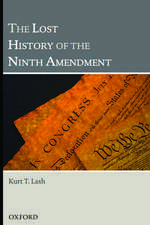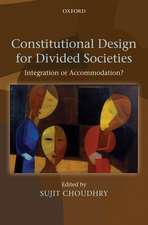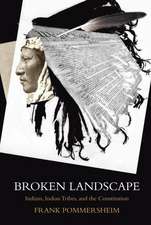Territory and Power in Constitutional Transitions
Editat de George Anderson, Sujit Choudhryen Limba Engleză Hardback – 12 mar 2019
Preț: 598.85 lei
Preț vechi: 853.78 lei
-30% Nou
Puncte Express: 898
Preț estimativ în valută:
114.61€ • 119.21$ • 94.61£
114.61€ • 119.21$ • 94.61£
Carte disponibilă
Livrare economică 13-19 martie
Preluare comenzi: 021 569.72.76
Specificații
ISBN-13: 9780198836544
ISBN-10: 0198836546
Pagini: 480
Dimensiuni: 164 x 240 x 33 mm
Greutate: 0.87 kg
Editura: OUP OXFORD
Colecția OUP Oxford
Locul publicării:Oxford, United Kingdom
ISBN-10: 0198836546
Pagini: 480
Dimensiuni: 164 x 240 x 33 mm
Greutate: 0.87 kg
Editura: OUP OXFORD
Colecția OUP Oxford
Locul publicării:Oxford, United Kingdom
Recenzii
This collection is highly impressive in both its breadth and depth. Local knowledge and theoretical sophistication combine to make this essential reading for scholars and practitioners interested in constitutions, federalism, territorial cleavages, and peace. The synthetic conclusion shows just how far we can advance knowledge through collaboration across national and disciplinary boundaries. We need more studies like this.
Territory and Power in Constitutional Transitions provides path-breaking analysis of conflicts rooted in territorial identity along with building blocks for academic theorists and wise counsel to practitioners. Drawing on a vast range of cases, the volume provides useful generalizations regarding how territorial interests are mobilized by geography, political history, and power, and how constitutional processes and design can sometimes succeed despite intense mobilization of territorial interests. It provides both hope and essential reading for anyone seeking peaceful, stable, and fair outcomes in territorially divided societies.
In its wide-ranging exploration of how constitutions help promote peace, stability and inclusion in deeply divided societies, this volume combines rich theoretical analysis with in-depth constitutional case-studies. Contributions from leading constitutional scholars and practitioners give it an impressive scope, with seventeen country cases studies. The insights it generates are both fresh and compelling. It deserves the widest possible audience.
While comparative constitutionalism is the stock in trade of conflict resolution practitioners, too often this is not accompanied by an understanding of the underlying logic and political dynamics that inform or limit constitutional options. It is here that Territory and Power in Constitutional Transitions makes an outstanding and invaluable contribution to our understanding of the logic of possible options for constitutional processes and design, especially in a context of territorial cleavages.
This compendium offers a unique perspective on a dizzying range of political and violent conflicts in societies rent by territorial cleavages. It leaves us with optimism about how constitutional processes may make such conflicts tractable. While each chapter captures the inescapable logic of institutional and political context, the editors painstakingly, and with great nuance, elaborate a general framework for understanding how divided societies might achieve reconstitution and even coexistence and integration. Territory and Power in Constitutional Transitions epitomizes what scholarship on comparative constitutional development should strive to achieve.
This remarkable contribution to the understanding of contemporary Libya doubles as a primer on violent conflict and its societal ramifications, and invites reexamination of other cases of mass civil violence. Recommended for larger college libraries and collections supporting international and conflict studies.
Territory and Power in Constitutional Transitions provides path-breaking analysis of conflicts rooted in territorial identity along with building blocks for academic theorists and wise counsel to practitioners. Drawing on a vast range of cases, the volume provides useful generalizations regarding how territorial interests are mobilized by geography, political history, and power, and how constitutional processes and design can sometimes succeed despite intense mobilization of territorial interests. It provides both hope and essential reading for anyone seeking peaceful, stable, and fair outcomes in territorially divided societies.
In its wide-ranging exploration of how constitutions help promote peace, stability and inclusion in deeply divided societies, this volume combines rich theoretical analysis with in-depth constitutional case-studies. Contributions from leading constitutional scholars and practitioners give it an impressive scope, with seventeen country cases studies. The insights it generates are both fresh and compelling. It deserves the widest possible audience.
While comparative constitutionalism is the stock in trade of conflict resolution practitioners, too often this is not accompanied by an understanding of the underlying logic and political dynamics that inform or limit constitutional options. It is here that Territory and Power in Constitutional Transitions makes an outstanding and invaluable contribution to our understanding of the logic of possible options for constitutional processes and design, especially in a context of territorial cleavages.
This compendium offers a unique perspective on a dizzying range of political and violent conflicts in societies rent by territorial cleavages. It leaves us with optimism about how constitutional processes may make such conflicts tractable. While each chapter captures the inescapable logic of institutional and political context, the editors painstakingly, and with great nuance, elaborate a general framework for understanding how divided societies might achieve reconstitution and even coexistence and integration. Territory and Power in Constitutional Transitions epitomizes what scholarship on comparative constitutional development should strive to achieve.
This remarkable contribution to the understanding of contemporary Libya doubles as a primer on violent conflict and its societal ramifications, and invites reexamination of other cases of mass civil violence. Recommended for larger college libraries and collections supporting international and conflict studies.
Notă biografică
George Anderson is former deputy minister (permanent secretary) in the Canadian government and subsequently CEO of the Forum of Federations. He has been a member of the Standby Team of Experts in the UN's Department of Political Affairs and consulted extensively around the world. He is currently a fellow at the Centre for Democracy and Diversity at Queen's University, Kingston, Canada, and has had earlier resident fellowships at Harvard and New York universities.Sujit Choudhry is an internationally recognized authority on comparative constitutional law, and has been an advised on constitution building, governance, and rule of law processes for over 20 years, including in Egypt, Jordan, Libya, Nepal, South Africa, Sri Lanka, Tunisia, Ukraine and Yemen. He founded and directs the Center for Constitutional Transitions (CT).

















